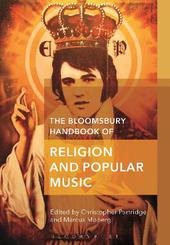
|
The Bloomsbury Handbook of Religion and Popular Music
Hardback
Main Details
Description
The Bloomsbury Handbook of Religion and Popular Music is the first comprehensive analysis of the most important themes and concepts in this field. Drawing on contemporary research from religious studies, theology, sociology, ethnography, and cultural studies, the volume comprises thirty-one specifically commissioned essays from a team of international experts. The chapters explore the principal areas of inquiry and point to new directions for scholarship. Featuring chapters on methodology, key genres, religious traditions and popular music subcultures, this volume provides the essential reference point for anyone with an interest in religion and popular music as well as popular culture more broadly. Religious traditions covered include Christianity, Islam, Judaism, Hinduism, Buddhism, Paganism and occultism. Coverage of genres and religion ranges from heavy metal, rap and hip hop to country music and film and television music. Edited by Christopher Partridge and Marcus Moberg, this Handbook defines the research field and provides an accessible entry point for new researchers in the field.
Author Biography
Christopher Partridge is Professor of Religious Studies in the Department of Politics, Philosophy and Religion at Lancaster University, UK. Recent publications include Mortality and Music: Popular Music and the Awareness of Death (Bloomsbury, 2015) The Occult World (2014, ed.,), The Lyre of Orpheus: Popular Music, the Sacred and the Profane (2014), Dub in Babylon (2010), and Holy Terror: Understanding Religion and Violence in Popular Culture (2010, ed.). He is co-editor of Bloomsbury Studies in Religion and Popular Music. Marcus Moberg is Senior Researcher in the Department of Comparative Religion, Abo Akademi University, Finland. He is the author of Christian Metal (Bloomsbury, 2015). His research is focused on contemporary intersections between religion, new media, popular culture, and consumer culture.
Reviews[The Bloomsbury Handbook of Religion and Popular Music] has a great deal to offer to students and instructors ... This is a useful resource indeed. * Religious Studies Review * As an introduction to the field for students on college and university courses, as well as researchers and librarians and the general reader, this handbook is very useful. Librarians, in particular where cross-disciplinary and cultural studies programs operate, will find the bibliography (cumulative at the end and perceptive in its own right) most timely. * Reference Reviews * The challenges of creating a comprehensive reader on religion and popular music are manifold. From the religious studies side arise questions about what counts as religion ... From the music studies side, scholars face vexing questions about how to define popular music ... Fortunately the editors and contributors to The Bloomsbury Reader of Religion and Popular Music have confronted these questions squarely and risen to the challenge. * Reading Religion * All the chapters in this excellent volume are accessible to readers without being a specialist in any of these particular academic disciplines ... An excellent introduction to what is gradually being recognized as an important area of study ... The Handbook will be of interest to musicologists, who are curious about the religious aspects of popular music; religious studies scholars and students who wish to know more about the importance of music for religions; and for anyone in cultural studies. I will certainly be using this Handbook for a number of my modules. * British Association for the Study of Religions Bulletin * The 'Genres' section of the book is a very useful tool, giving go-to summaries, critical reviews of the literature and useful historical context ... As a whole in challenging concepts of strict distinctions between institutional religions and religiously tinged cultural practices outside of them, this volume achieves something of significance and offers many possible directions for further study when read through the lens of an interest in celebrity. * Celebrity Studies * The book's relevance to religious studies is not limited to connections between 'religion' and 'popular music': it also reflects a wider scope of research interests and phenomena in contemporary societies. * Uskonnontutkija (Bloomsbury Translation) * A truly groovy one stop resource for students and scholars of religion and popular music. Wide-ranging in its coverage of religious traditions, musical genres, and disciplinary approaches, this book sets the standard for the emerging field of research. -- Titus Hjelm, Reader in Sociology, University College London, UK All scholars and students in the field of religion and popular music, as well as the educated public, have been waiting patiently and eagerly for a volume like this-a magnificent feast of information and references for the eyes and ears that include disc and film. Whether one is an enthusiast of Christian rock, Jewish Klezmer, Islamic Qawwali, Indian and Bollywood popbhajan, Tibetan chant--from jazz and blues to heavy metal to rap to country, from the Beatles to Madonna and Beyonce--here is the dream tool to access all the new and evolving trends of spirituality entering the hearts of music listeners worldwide. On top of that, the latest methods of academic research in religious studies, theology, ethnomusicology, and sociology, are applied to key genres, popular subcultures, and lesser-known artistic expressions--a winning combination! -- Guy Beck, Adjunct Professor of Religious Studies, Loyola University, USA Wide ranging in theme and approach, this collection will spark the interest of any scholar of religion and popular music. Its strongest essays-for example on hip-hop, country music, and "theology and imagination"-are state of the art, and its running dialogues about the role of fandom and engaged participation in scholarly analysis are illuminating. In general the breadth is impressive, and readers with special interests in music as transgressive or in subgenres of metal and electronic dance music will find the most emphasis there. -- Mark Hulsether, Professor of Religious Studies, University of Tennessee, USA
|